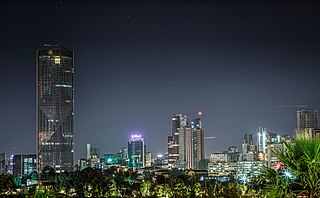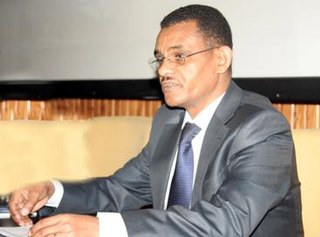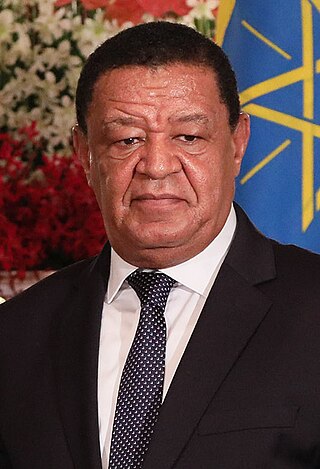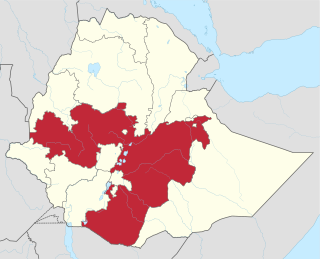
The politics of Ethiopia are the activities associated with the governance of Ethiopia. The government is structured as a federal parliamentary republic with both a President and Prime Minister. The legislature is multicameral, with a house of representatives and a council. The term politics of Ethiopia mainly relates to the political activities in Ethiopia after the late 20th century when democratization took place in the nation. The current political structure of Ethiopia was formed after the Tigrayan People's Liberation Front (TPLF) overthrew dictator President Mengistu Haile Mariam in 1991. A general election was held in June 1994 and Ethiopia has maintained a multiparty political environment until today.

Addis Ababa is the capital and largest city of Ethiopia. In the 2007 census, the city's population was estimated to be 2,739,551 inhabitants. Addis Ababa is a highly developed and important cultural, artistic, financial and administrative centre of Ethiopia.

The government of Ethiopia is the federal government of Ethiopia. It is structured in a framework of a federal parliamentary republic, whereby the prime minister is the head of government. Executive power is exercised by the government. The prime minister is chosen by the lower chamber of the Federal Parliamentary Assembly. Federal legislative power is vested in both the government and the two chambers of parliament. The judiciary is more or less independent of the executive and the legislature. They are governed under the 1995 Constitution of Ethiopia. There is a bicameral parliament made of the 108-seat House of Federation and the 547-seat House of Peoples' Representatives. The House of Federation has members chosen by the regional councils to serve five-year terms. The House of Peoples' Representatives is elected by direct election, who in turn elect the president for a six-year term.

Girma Wolde-Giorgis was an Ethiopian politician who was the president of Ethiopia from 2001 to 2013. He was the second person to hold the office of president since the founding of the Federal Democratic Republic of Ethiopia in 1995.

Addis Ababa University (AAU) is a national university located in Addis Ababa, Ethiopia. It is the oldest university in Ethiopia. AAU has thirteen campuses. Twelve of these are situated in Addis Ababa, and one is located in Bishoftu, about 45 kilometres (28 mi) away. AAU has several associated research institutions including the Institute of Ethiopian Studies. The Ministry of Education admits qualified students to AAU based on their score on the Ethiopian University Entrance Examination (EUEE).
Ahmad Taqi "Hundee" Sheikh Mohammed Rashid was an Ethiopian Oromo nationalist, known, along with his comrade Elemo Qiltu, as the "first true fighters and martyrs of the Oromo causes". It was these two persons and their few colleagues who founded an organization with a fighting unit that bears the name of the Oromo people, although before them, many nationalists had fought and died for the Oromo causes. In addition, these men are credited with reviving and popularizing usage of the name Oromo in early 1970s.

People's Republic of China–Ethiopia relations were established in 1970. Ethiopia has an embassy in Beijing and the People's Republic of China has an embassy in Addis Ababa.

Alemayehu Atomsa was an Ethiopian politician who served as the president of the Oromia Region, the largest of the country's regions, from 2010 until his resignation due to illness in 2014, from which he died in Bangkok, Thailand, on 6 March 2014.
Diriba Kuma is an Ethiopian diplomat who was the 30th Mayor of Addis Ababa, who took office on 9 July 2013 until 16 July 2018. Diriba served as Minister of Transport from October 2010 to July 2013 before being elected as Mayor of Addis Ababa. After his term as mayor, he was appointed as an ambassador to foreign countries by President Mulatu Teshome. Currently, he is an ambassador to Sweden as well as other Nordic countries since March 2019.

The Massacre of the Sixty, or Black Saturday, was an execution that took place in Addis Ababa, Ethiopia commissioned by the Derg government against 60 imprisoned former government officials at Kerchele Prison on the morning of 23 November 1974. The prison was commonly called Alem Bekagn – "I've had enough of this world".

Mulatu Teshome Wirtu is an Ethiopian politician who was the president of Ethiopia from 2013 to 2018.

Tadesse Birru was an Ethiopian general of the Imperial Ethiopian Army and civil rights activist. Initially a strong proponent of Ethiopian unity, Tadesse eventually became an activist for the empowerment of the Oromo people in the 1960s. His advocacy turned into repeated attempts to overthrow the government through a coup and later through a military rebellion. He was eventually captured and executed by the Derg regime. He is considered to be the father of modern Oromo nationalism.
The following lists events that happened during 2013 in Ethiopia.
The following lists events that happened during 2005 in Ethiopia.

A snap presidential election was held in Ethiopia on 25 October 2018, prompted by the resignation of incumbent Mulatu Teshome. It was the fifth presidential election of the Federal Democratic Republic of Ethiopia to elect its fourth president.
The Burayu massacre was a series of communal clashes which occurred in the vicinity of the Ethiopian town of Burayu, in the Oromia Region, on 14–16 September 2018. Individuals from the Oromo and Dorze ethnicities fought in and around Burayu, a town in Oromia Region which is located near the northwest boundary of Addis Ababa, the federal capital. Different sources cite number of civilians killed both from Oromo and non-Oromo ethnicity.

The Hachalu Hundessa riots were a series of civil unrest that occurred in the Oromia Region of Ethiopia, more specifically in the hot spot of Addis Ababa, Shashamene and Ambo following the killing of the Oromo musician Hachalu Hundessa on 29 June 2020. The riots lead to the deaths of at least 239 people according to initial police reports. Peaceful protests against Hachalu's killing have been held by Oromos abroad as well. The Ethiopian Human Rights Commission (EHRC) found in its 1 January 2021 full report that part of the killings were a crime against humanity, with deliberate, widespread systematic killing of civilians by organised groups. The EHRC counted 123 deaths, 76 of which it attributed to security forces.
The Ethiopian Golden Age of Music was an era of Ethiopian music that began around the 1960s to 1970s, until the Derg regime progressively diminished its presence through politically motivated persecutions and retributions against musicians and companies, which left many to self-imposed exile to North America and Europe. Several artists and musical companies, as well as recording groups, emerged to produce their own singles and albums; the first being Amha Records, and Philips Records, Ethiopia Records and Kaifa Records, which is primarily based in Addis Ababa.












